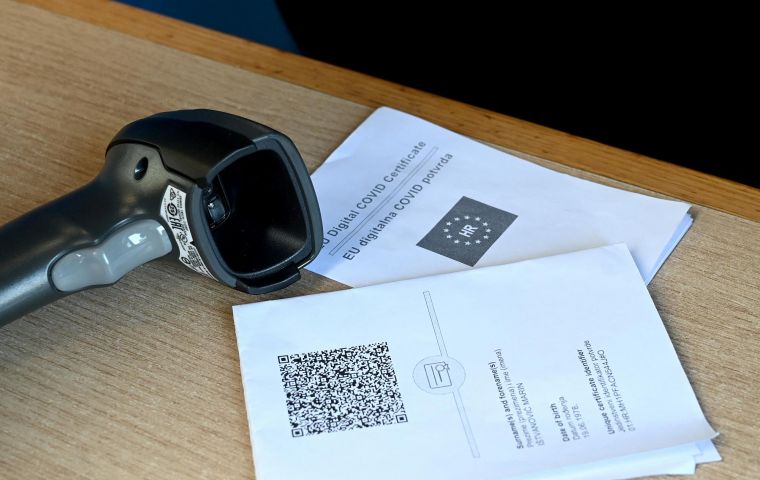MercoPress. South Atlantic News Agency
European Parliament: OK to Green Passport for covid-free travelers
 Vaccine passports are also good for concerts, sporting events and other everyday situations
Vaccine passports are also good for concerts, sporting events and other everyday situations The European Parliament (EP) Wednesday approved using a digital certificate attesting to a person's situation regarding covid-19, which will allow travellers to prove if they have been vaccinated, overcome the disease, or obtain a negative result to a PCR test.
The move is expected to boost the mobility of Europeans for the upcoming Summer season.
The motion, which collected 546 votes in favour, 93 against and 51 abstentions, represents a new step in the legislative process for this document to enter into force on July 1, although several countries are already are using it.
As per the new legislation, Member States have vowed not to impose additional restrictions on certificate holders. But Governments continue, however, to reserve the option of applying these measures - such as quarantines or PCR on arrival - if the health situation worsens, although they will have to ensure that they are proportionate restrictions and inform them well in advance of the European institutions and citizens on its coverage, duration and justification.
The certificate will not be equivalent to a passport, since it will be possible to travel without it through Europe, but it will facilitate entry into other countries and allow to benefit from exemptions from quarantines, tests on arrival or other measures, which many countries are already beginning to implement.
The Green Pass is available in physical or digital format and will be completely free. In the absence of some legal procedures at the community level, a series of European countries have begun to deliver and validate the first certificates; Spain has been one of those that have anticipated the official date of entry into force of July 1 and began issuing them on June 7.
Many countries are also adjusting their entry requirements to the regulations and in the coming weeks, they will relax the restrictions they have been imposing on citizens of other Member States who can prove that they have been vaccinated, tested negative in a recent PCR or overcome the disease.
The new document which is already issued by Germany, Bulgaria, Croatia, Denmark, Spain, Greece, Lithuania, Poland and the Czech Republic is expected to facilitate travel.
The new travel document will allow people to travel between the 27 countries of the European bloc without being quarantined or taking extra Covid-19 tests.
The certificate includes three documents: one that attests that the carrier has been fully vaccinated against Covid-19, one that the person tested negative, and another that indicates that the person has already contracted the disease.
Documents will be issued free of charge, in digital or paper format, and must avoid the imposition of quarantines in destination countries.
Currently, each country has its own rules. “It's the European answer to ending the mosaic of different rules,” said French centrist lawmaker Nathalie Colin-Oesterlé.
The European Commissioner of Justice, Didier Reynders, encouraged the countries of the bloc to adopt the certificate immediately, to avoid bureaucratic problems at the beginning of the summer (which starts at the end of the month in the northern hemisphere).
According to Reynders, “more than a million citizens have already received certificates, and many more will in the coming weeks and months.”
The project focuses on the return to the free movement of people within the European bloc, but the 27 member states can use the certificates for other purposes, such as festivals, concerts and/or sporting events.
Despite the broadly favourable vote, MEPs expressed reservations about the bill. Among the criticisms are the protection of personal data and possible discrimination, as there is no guarantee of free tests.




Top Comments
Disclaimer & comment rulesCommenting for this story is now closed.
If you have a Facebook account, become a fan and comment on our Facebook Page!